Gulliver's Travels, Jonathan Swift [best romance books of all time TXT] 📗
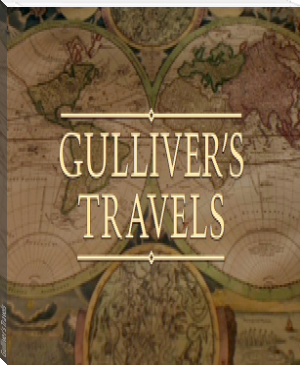
- Author: Jonathan Swift
Book online «Gulliver's Travels, Jonathan Swift [best romance books of all time TXT] 📗». Author Jonathan Swift
They have had the art of printing, as well as the Chinese, time out of mind: but their libraries are not very large; for that of the king, which is reckoned the largest, doth not amount to above a thousand volumes, placed in a gallery of twelve hundred feet long, from whence I had liberty to borrow what books I pleased. The queen's joiner had contrived in one of Glumdalclitch's rooms, a kind of wooden machine, five-and-twenty feet high, formed like a standing ladder; the steps were each fifty feet long: it was indeed a movable pair of stairs, the lowest end placed at ten feet distance from the wall of the chamber. The book I had a mind to read was put up leaning against the wall: I first mounted to the upper step of the ladder, and turning my face towards the book began at the top of the page, and so walking to the right and left about eight or ten paces, according to the length of the lines, till I had gotten a little below the level of mine eyes, and then descending gradually, till I came to the bottom: after which I mounted again, and began the other page in the same manner, and so turned over the leaf, which I could easily do with both my hands, for it was as thick and stiff as a paste-board, and in the largest folios not above eighteen or twenty feet long.
Their style is clear, masculine, and smooth, but not florid; for they avoid nothing more than multiplying unnecessary words, or using various expressions. I have perused many of their books, especially those in history and morality. Among the rest, I was much diverted with a little old treatise, which always lay in Glumdalclitch's bed-chamber, and belonged to her governess, a grave elderly gentlewoman, who dealt in writings of morality and devotion. The book treats of the weakness of human kind, and is in little esteem, except among the women and the vulgar. However, I was curious to see what an author of that country could say upon such a subject.
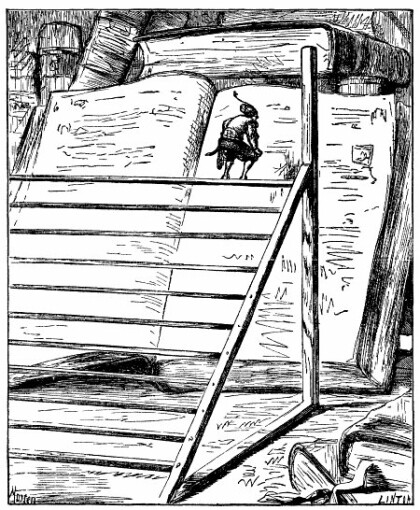
This writer went through all the usual topics of European moralists, showing how diminutive, contemptible, and helpless an animal was man in his own nature; how unable to defend himself from inclemencies of the air, or the fury of wild beasts; how much he was excelled by one creature in strength, by another in speed, by a third in foresight, by a fourth in industry. He added, that nature was degenerated in these latter declining ages of the world, and could now produce only small births, in comparison to those in ancient times. He said, it was very reasonable to think, not only that the species of men were originally much larger, but also, that there must have been giants in former ages; which as it is asserted by history and tradition, so it hath been confirmed by huge bones and skulls, casually dug up in several parts of the kingdom, far exceeding the common dwindled race of man in our days. He argued, that the very laws of nature absolutely required we should have been made in the beginning of a size more large and robust, not so liable to destruction, from every little accident, of a tile falling from a house, or a stone cast from the hand of a boy, or being drowned in a little brook. From this way of reasoning the author drew several moral applications, useful in the conduct of life, but needless here to repeat. For my own part, I could not avoid reflecting, how universally this talent was spread, of drawing lectures in morality, or, indeed, rather matter of discontent and repining, from the quarrels we raise with nature. And I believe, upon a strict inquiry, those quarrels might be shown as ill-grounded among us as they are among that people.
As to their military affairs, they boast that the king's army consists of a hundred and seventy-six thousand foot, and thirty-two thousand horse: if that may be called an army which is made up of tradesmen in the several cities, and farmers in the country, whose commanders are only the nobility and gentry, without pay or reward. They are indeed perfect enough in their exercises, and under very good discipline, wherein I saw no great merit; for how should it be otherwise, where every farmer is under the command of his own landlord, and every citizen under that of the principal men in his own city, chosen after the manner of Venice, by ballot?
I have often seen the militia of Lorbrulgrud drawn out to exercise in a great field, near the city, of twenty miles square. They were in all not above twenty-five thousand foot, and six thousand horse: but it was impossible for me to compute their number, considering the space of ground they took up. A cavalier, mounted on a large steed, might be about ninety feet high. I have seen this whole body of horse, upon a word of command, draw their swords at once, and brandish them in the air. Imagination can figure nothing so grand, so surprising, and so astonishing! it looked as if ten thousand flashes of lightning were darting at the same time from every quarter of the sky.
I was curious to know how this prince, to whose dominions there is no access from any other country, came to think of armies, or to teach his people the practice of military discipline. But I was soon informed, both by conversation and reading their histories: for in the course of many ages, they have been troubled with the same disease to which the whole race of mankind is subject; the nobility often contending for power, the people for liberty, and the king for absolute dominion. All which, however, happily tempered by the laws of that kingdom, have been sometimes violated by each of the three parties, and have more than once occasioned civil wars, the last whereof was happily put an end to by this prince's grandfather, in a general composition;[83] and the militia, then settled with common consent, hath been ever since kept in the strictest duty.
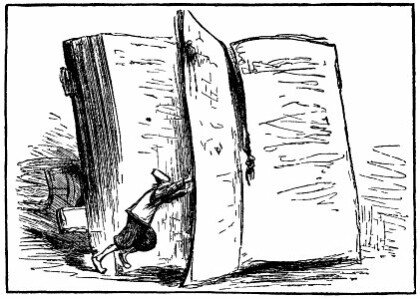

CHAPTER VIII
THE KING AND QUEEN MAKE A PROGRESS[84] TO THE FRONTIERS. THE AUTHOR ATTENDS THEM. THE MANNER IN WHICH HE LEAVES THE COUNTRY VERY PARTICULARLY RELATED. HE RETURNS TO ENGLAND.
I had always a strong impulse that I should sometime recover my liberty, though it was impossible to conjecture by what means, or to form any project with the least hope of succeeding. The ship in which I sailed was the first ever known to be driven within sight of the coast; and the king had given strict orders, that if at any time another appeared, it should be taken ashore, and with all its crew and passengers brought in a tumbrel[85] to Lorbrulgrud. I was treated with much kindness: I was the favorite of a great king and queen, and the delight of the whole court; but it was upon such a footing as ill became the dignity of human kind. I could never forget those domestic pledges I had left behind me. I wanted to be among people with whom I could converse upon even terms, and walk about the streets and fields, without being afraid of being trod to death like a frog or a young puppy. But my deliverance came sooner than I expected, and in a manner not very common: the whole story and circumstances of which I shall faithfully relate.

"SHE HAD SOME FOREBODING."
I had now been two years in this country; and about the beginning of the third, Glumdalclitch and I attended the king and queen in a progress to the south coast of the kingdom. I was carried, as usual, in my travelling-box, which, as I have already described, was a very convenient closet of twelve feet wide. And I had ordered a hammock to be fixed by silken ropes from the four corners at the top, to break the jolts, when a servant carried me before him on horseback, as I sometimes desired, and would often sleep in my hammock while we were upon the road. On the roof of my closet, not directly over the middle of the hammock, I ordered the joiner to cut out a hole of a foot square, to give me air in hot weather as I slept, which hole I shut at pleasure with a board that drew backwards and forwards through a groove.
When we came to our journey's end, the king thought proper to pass a few days at a palace he hath near Flanflasnic, a city within eighteen English of the sea-side Glumdalclitch and I were much fatigued, I had gotten a small cold, but the poor girl was so ill as to be confined to her chamber. I longed to see the ocean, which must be the only scene of my escape, if ever it should happen I pretended to be worse than I really was, and desired leave to take the fresh air of the sea with a page, whom I was very fond of, and who had sometimes been trusted with me. I shall never forget with what unwillingness Glumdalclitch consented, nor the strict charge she gave the page[86] to be careful of me, bursting at the same time into a flood of tears, as if she had some foreboding of what was to happen.
The boy took me out in my box about half-an-hour's walk from the palace towards the rocks on the sea-shore. I ordered him to set me down, and lifting up one of my sashes, cast many a wistful melancholy look towards the sea. I found myself not very well, and told the page that I had a mind to take a nap in my hammock, which I hoped would do me good. I got in, and the boy shut the window close down to keep out the cold. I soon fell asleep, and all I can conjecture is, that while I slept, the page, thinking no danger could happen, went among the rocks to look for birds' eggs, having before observed him from my windows searching about, and picking up one or two in the clefts. Be that as it will, I found myself suddenly awaked with a violent pull upon the ring, which was fastened at the top of my box for the conveniency of carriage. I felt my box raised very high in the air, and then borne forward with prodigious speed. The first jolt had like to have shaken me out of my hammock, but afterwards the motion was easy enough. I called out several times, as loud as I could raise my voice, but all to no purpose. I looked towards my windows, and could see nothing but the clouds and sky. I heard a noise just over my head like the clapping of wings, and then began to perceive the woful condition I was in, that some eagle had got the ring of my box in his beak, with an intent to let it fall on a rock like a tortoise in a shell, and then pick out my body and devour it; for the sagacity and smell of this bird enabled him to discover his quarry[87] at a great distance, though better concealed than I could be within a two-inch board.

In a little time I observed the noise and flutter of wings to increase very fast, and my box was tossed up and down like a sign in a windy day. I heard several bangs or buffets, as I thought, given to the eagle (for such I am certain it must have been, that held the ring of my box in his beak), and then all on a
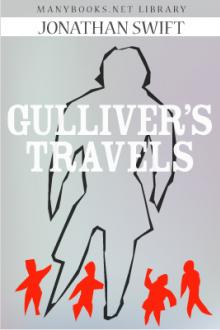
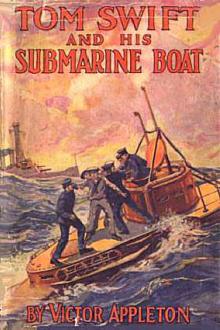



Comments (0)